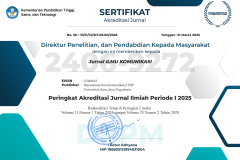Communication Dynamics Between First-Year Doctoral Students and Supervisors
DOI:
https://doi.org/10.24002/jik.v20i2.5735Keywords:
appraisal system, doctoral students, linguistic mechanism, student-supervisor communicationAbstract
Building and maintaining a relationship with the supervisor is crucial for a doctoral student to guarantee stable progress. One of the important aspects is owing to both written and spoken communication, for example, in email and direct conversations. This study examines sample communication activitie of three Indonesian doctoral students and their supervisors to unfold the construction of shared values between them. An appraisal system analyses the linguistic mechanism of engagement, attitude, and graduation systems through which power and relationship are built between first-year doctoral students and their supervisors.
References
Bernard, J. M., & Goodyear, R. K. (2019). Fundamentals of clinical supervision (6th ed). New York, NY: Pearson.
Bitzer, E. M., & Albertyn, R. M. (2011). Alternative approaches to postgraduate supervision: A planning tool to facilitate supervisory processes. South African Journal of Higher Education, 25(5), 875-888.
Christie, F., & Unsworth, L. (2000). Developing socially responsible language research, researching language in schools and communities: Functional linguistic perspectives. Washington, USA: Cassell.
Eggins, S., & Slade, D. (1997). Analysing casual conversation. London, UK: Equinox.
Eshtiaghi, N., Robertson, S. & Warren-Myers, G. (2012). Good practice groundwork: Managing initial meetings with higher degree research students. Education for Chemical Engineers, 7(4), 196-202.
Ferguson, A. (2010). Appraisal in student–supervisor conferencing: A linguistic analysis. International Journal of Language & Communication Disorders, 45(2), 215-229.
Fuoli, M. (2012). Assessing social responsibility: A quantitative analysis of Appraisal in BP’s and IKEA’s social reports. Discourse & Communication, 6(1), 55–81.
Gales, T. (2011). Identifying interpersonal stance in threatening discourse: An appraisal analysis. Discourse Studies, 13(1), 27–46.
Goodwin, C., & Heritage, J. (1990). Conversation analysis. Annual Review of Anthropology, 19(1), 283-307.
Gunasekera, G., Liyanagamage, N., & Fernando, M. (2021). The role of emotional intelligence in student-supervisor relationships: Implications on the psychological safety of doctoral students. The International Journal of Management Education, 19(2), 1-10.
Hodza, F. (2007). Managing the student-supervisor relationship for successful postgraduate supervision: A sociological perspective. South African Journal of Higher Education, 21(1), 1155-1165.
Hodza, F. (2012). Deconstructing ideologies and practices of homeless youth crisis intervention. Dissertation. University of Illinois at Urbana-Champaign, Champaign, IL.
Ives, G. and G. Rowley. (2005). Supervisor selection or allocation and continuity of supervision: Ph.D. students’ progress and outcomes. Studies in Higher Education, 30(5), 535–555.
Križan, A. (2016). The language of appraisal in British advertisements: The construal of attitudinal judgement. ELOPE: English Language Overseas Perspectives and Enquiries, 13(2), 199–220.
Lee, A. (2008). How are doctoral students supervised? Concepts of doctoral research supervision. Studies in Higher education, 33(3), 267-281.
Mainhard, T., Van Der Rijst, R., Van Tartwijk, J., & Wubbels, T. (2009). A model for the supervisor–doctoral student relationship. Higher Education, 58(3), 359-373.
Martin, J. R., & White, P. R. (2005). The language of evaluation: Appraisal in English. Basingstoke, UK: Palgrave Macmillan.
McCormack, C. & B. Pamphilon. (2004). More than a confessional: Postmodern groupwork to support postgraduate supervisors’ professional development. Innovations in Education and Teaching International, 41(1), 23–37.
Miller, D. E. (1998). Enhancing adolescent competence: Strategies for classroom management. Wadsworth Publishing Company.
Orellana, M. L., Darder, A., Pérez, A., & Salinas, J. (2016). Improving doctoral success by matching Ph.D. students with supervisors. International Journal of Doctoral Studies, 11, 87-103.
Pearson, M., & Kayrooz, C. (2004). Enabling critical reflection on research supervisory practice. International Journal for Academic Development, 9, 99–116.
Philips, E. M., & Pugh, D. S. (1994). How to get a PhD: A handbook for students and their supervisors (4th ed). Glasgow, UK: Open University Press.
Rose, D., & Martin, J. R. (2012). Learning to write, reading to learn: Genre, knowledge and pedagogy in the Sydney School. London, UK: Equinox.
Thomas, D. (2016). The PhD writing handbook. London, UK: Palgrave.
Unsworth, K. L., Turner, N., Williams, H., & Piccin‐Houle, S. (2010). Giving thanks: The relational context of gratitude in postgraduate supervision. Studies in Higher Education, 35(8), 871–888.
Downloads
Published
How to Cite
Issue
Section
License

This work is licensed under a Creative Commons Attribution 4.0 International License.
Jurnal ILMU KOMUNIKASI is an academic journal. As such, it is dedicated to the open exchange of information. For this reason, JIK is freely available to individuals and institutions. Authors who publish in Jurnal ILMU KOMUNIKASI will release their articles under the Creative Commons Attribution (BY) License. This license allows anyone to copy and redistribute the article in any medium or format as well as remix, transform, and build upon the material for any purpose, even commercially as long as they credit the authors for the original creation. For details of the rights authors grants users of their work, see the "human-readable summary" of the license, with a link to the full license. (Note that "you" refers to a user, not an author, in the summary)
 This work is licensed under a Creative Commons Attribution 4.0 International License.
This work is licensed under a Creative Commons Attribution 4.0 International License.














